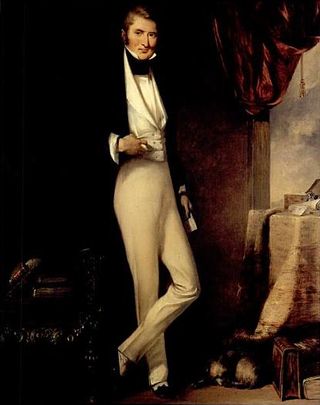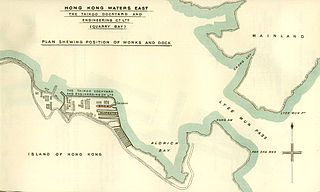
William Jardine was a Scottish opium trader and physician who co-founded the Hong Kong–based conglomerate Jardine, Matheson & Co. Educated in medicine at the University of Edinburgh, in 1802 Jardine obtained a diploma from the Royal College of Surgeons of Edinburgh. The next year, he became a surgeon's mate aboard the Brunswick belonging to the East India Company, and set sail for India. In May 1817, he abandoned medicine for trade.
Beer in China was the dominant alcoholic beverage through the Han dynasty, after which it was eclipsed by rice wine. Modern brewing appeared in the late 1800s, brought to China by Europeans who brewed pale lagers, such as Tsingtao. Both beer production and consumption of local and imported brands grew increasingly popular in the 20th century. In the 21st century, China became the world's largest consumer of beer, commercial scale brewing expanded, and craft beer began to spread beyond expatriate communities and make inroads amongst the Chinese population.

Tsingtao Brewery Co. Ltd. is China's second largest brewery, with about 15% of domestic market share and also accounts for half of China's national beer exports. The brewery was founded in 1903 as an Anglo–German business with the brewery under the supervision of master brewers from Germany in Tsingtao, Kiautschou Bay Leased Territory, a 552 km2 (213 sq mi) area leased by the government of China to Imperial Germany.

Thomas Blake Glover was an Anglo-Scottish merchant in Bakumatsu and Meiji-period Japan.

Sir James Nicolas Sutherland Matheson, 1st Baronet, FRS, was a Scottish opium trader and taipan. Born in Shiness, Lairg, Sutherland, Scotland, he was the son of Captain Donald Matheson. He attended Edinburgh's Royal High School and the University of Edinburgh. He and William Jardine went on to co-found the Hong Kong-based trading conglomerate Jardine Matheson & Co. that became today's Jardine Matheson Holdings.
The Keswick family are a business dynasty of Scottish origin associated with the Far East region since 1855 and in particular the conglomerate Jardine Matheson.

Taikoo Dockyard and Engineering Company was a dockyard in what is now Taikoo Shing, MTR Tai Koo station and part of Taikoo Place of Quarry Bay on the Hong Kong Island in Hong Kong. It predates the era before the reclamation of Victoria Harbour.

Wu Bingjian, trading as "Houqua" and better known in the West as "Howqua" or "Howqua II", was a hong merchant in the Thirteen Factories, head of the E-wo hong and leader of the Canton Cohong. He was once the richest man in the world.
A hong was a type of Chinese merchant establishment and its associated type of building. Hongs arose in Guangzhou as intermediaries between Western and Chinese merchants during the 18–19th century, under the Canton System.
Zhujiang Brewery was established in 1985 and is a large state-owned enterprise which deals mainly in beer and related products such as labels, cartons, crates, etc. The brewery is one of the largest single site production facilities in the world, and produces Zhujiang Beer.

The production of beer in Tibet is a relatively recent phenomenon in Tibetan cuisine. The Chinese established the Lhasa Brewery Company in 1988, which is located in Lhasa.

Dodwell & Co. or Dodwell's, was one of the leading British merchant firms, or hongs, active in China and Japan during the 19th and 20th century. It was a direct rival to Jardine, Matheson & Co.
Hollingworth Magniac (1786–1867) was a merchant and connoisseur of medieval art. He briefly ran the free trading firm of Magniac & Co. which was later to become Jardine, Matheson & Co., one of the largest trading houses in Asia during the 19th century.
The Ewo Hong was a Qing dynasty hong established by Wǔ Guóyíng in Canton (Guangzhou) in 1783 and later became the leader of the cohong of the Thirteen Factories under the stewardship of Howqua, who took over in 1803. Ewo later became one of the most successful hongs and the largest creditor of the East India Company, whilst Howqua's personal monetary worth reached more than 26 million Mexican dollars. As a result of the Ewo hong's upright and honest reputation, Jardine, Matheson & Co. later adopted "Ewo" as the Chinese name for their firm.

The Indo-China Steam Navigation Company, Limited (ICSNC), was established in 1873 as a subsidiary of Hong Kong–based Jardine, Matheson & Co., one of the largest trading companies in the Far East at that time.

Jardine, Matheson & Co., later Jardine, Matheson & Co., Ltd., forerunner of today's Jardine Matheson Holdings, was a Far Eastern company founded in 1832 by Scotsmen William Jardine and James Matheson as senior partners. Trafficking opium in Asia, while also trading cotton, tea, silk and a variety of other goods, from its early beginnings in Canton, in 1844 the firm established its head office in the new British colony of Hong Kong then proceeded to expand all along the China Coast.

Jardine Matheson Holdings Limited is a Hong Kong–based, Bermuda-domiciled British multinational conglomerate. It has a primary listing on the London Stock Exchange and secondary listings on the Singapore Exchange and Bermuda Stock Exchange. The majority of its business interests are in Asia, and its subsidiaries include Jardine Pacific, Jardine Motors, Hongkong Land, Jardine Strategic Holdings, DFI Retail Group, Mandarin Oriental Hotel Group, Jardine Cycle & Carriage and Astra International. It set up the Jardine Scholarship in 1982 and Mindset, a mental health-focused charity, in 2002.

David Fortune "Taffy" Landale, JP, was a British-Hong Kong entrepreneur and politician who was chairman and managing director of Jardine Matheson & Co. from 1945 to 1951, during which he was appointed by the Hong Kong government as an unofficial member of the Executive Council from 1946 to 1951, as well as the senior unofficial member of the Legislative Council from 1946 to 1950. Later in his life he settled in the United Kingdom, where he was chairman of the Royal Bank of Scotland between 1955 and 1965.
Nanking Football Club is a defunct amateur Chinese football club that predominantly competed in the former capital of China Nanjing from 1930 until 1937–1938. The name was reused in 2016 by Merim Brkić who started the new Nanjing F.C. and adopted the same values as the original club. It has been frequently referred as Nanjing Football Club after the pinyin language reform, when Nanjing was gradually adopted as the standard spelling of the city's name in most languages that use the Roman alphabet.

The Yangshupu Waterworks is a waterworks built in 1883, and located at 830 Yangshupu Road (杨树浦路830号) in the district of Yangpu, Shanghai, China. The waterworks was the first of its kind to be built in China and provided running water for the first time to some of the cities' residents. It belongs to the Shanghai Water Company and occupies a site of 32 acres and has four major lines of tap water allowing for a maximum capacity of around 1.5 million cubic metres a day. In 2009 it supplied 400 million cubic metres of water, about 20% of the total water supply of Shanghai.













